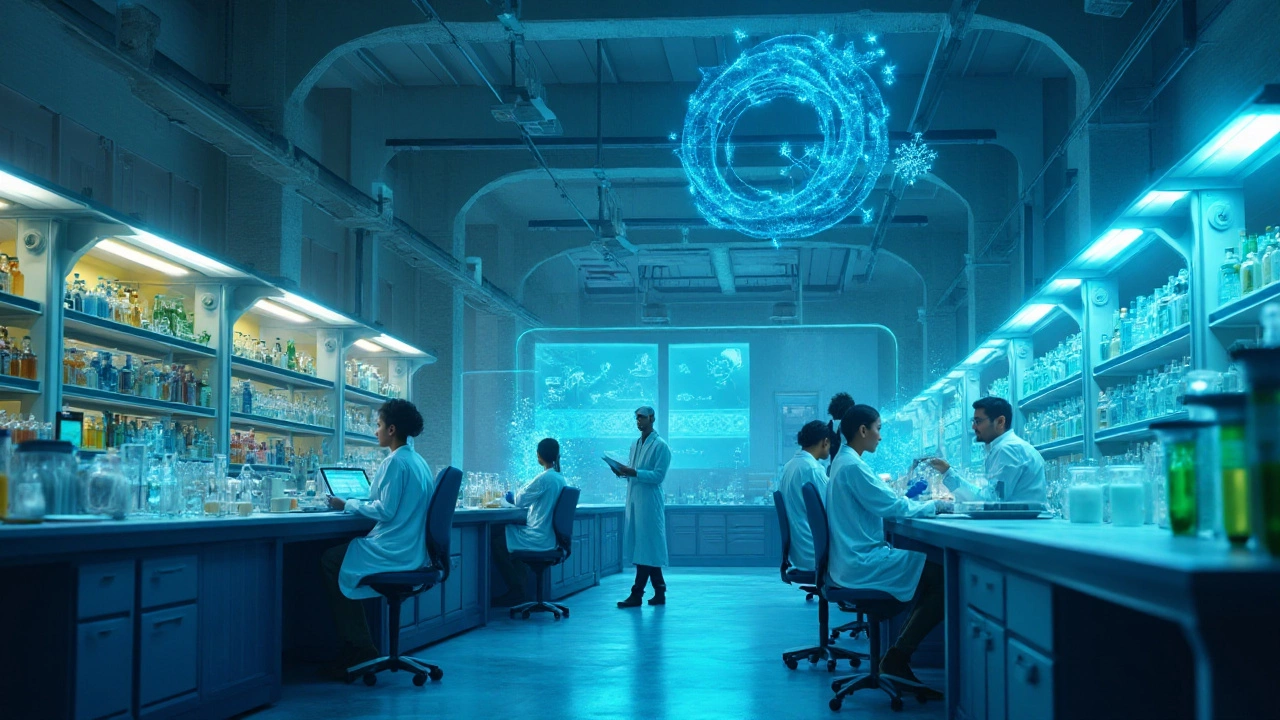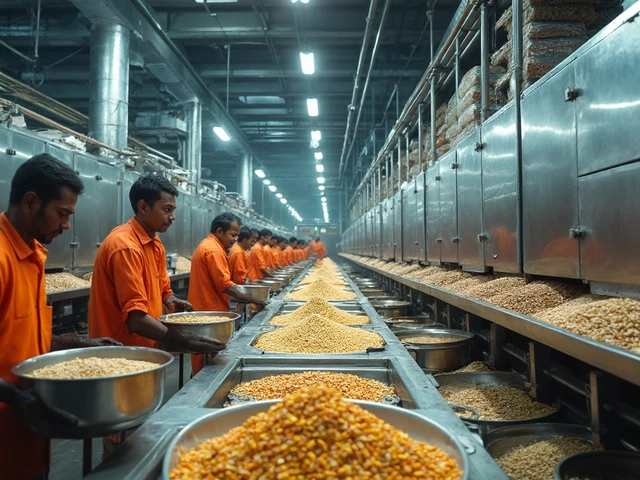The future of pharmacy, especially in India, looks poised to undergo remarkable transformation over the coming decade. While the traditional roles within pharmaceutical manufacturing remain, new technologies and approaches are ushering new opportunities and challenges alike. Today, innovations from artificial intelligence to nanotechnology are beginning to reshape how drugs are produced, approved, and delivered to patients. As a hub for international pharma manufacturing, India stands to play a significant role in global healthcare advancements.
The Indian pharmaceutical landscape is embracing more sustainable practices, responding to global calls for environmentally responsible production methods. Coupled with advancements in pharmacogenomics, the ability to personalize medicine like never before is nearly within reach. The future holds exciting possibilities that aim to benefit patient outcomes and redefine what we know about pharmaceuticals today.
- Technological Advancements in Drug Manufacturing
- Sustainable Practices in Pharma
- Regulatory Changes and Global Impact
- The Role of Pharmacogenomics in Personalizing Medicine
Technological Advancements in Drug Manufacturing
The landscape of drug manufacturing is experiencing a significant transformation, particularly in India, driven by cutting-edge technological advancements. These changes are not just incremental improvements but are paving the way for a fundamentally new approach to pharmacy future. One of the key technologies leading this change is artificial intelligence (AI), which is reshaping how drugs are discovered and developed. AI algorithms can process vast amounts of data and predict which compounds could effectively treat specific conditions, saving years of research and billions in development costs. A study by Accenture estimates that by 2030, AI could save the global healthcare sector up to $150 billion annually.
Another exciting development is the use of 3D printing for personalized medicine. 3D printing allows for rapid prototyping and the production of customized drugs tailored to individual patient needs. This innovation is particularly beneficial for producing exact dosages and even creating combination pills—eliminating the hassle of taking multiple medications. 3D printing in pharmaceuticals not only improves patient compliance but also reduces manufacturing waste—an important step towards more sustainable practices in pharma.
Nanotechnology is also set to play a significant role in future drug manufacturing. By manipulating materials at a nanoscale, scientists can create drug delivery systems that target specific cells in the body, increasing efficacy and reducing side effects. Imagine a cancer drug that directly attacks tumors without harming healthy cells. This precision medicine approach not only promises better outcomes for patients but could revolutionize how we think about disease treatment.
"Nanotechnology will dramatically change the landscape of drug delivery and diagnostics in the next decade," says Dr. Anjali Sharma, a leading researcher at the Indian Institute of Technology.
Cloud computing and big data analytics are transforming how pharmaceutical manufacturers handle data. They enable seamless sharing of information across global networks, ensuring compliance with regulatory standards and streamlining operations. With cloud-based platforms, companies manage their entire manufacturing processes more efficiently, making it easier to respond to changes in demand or supply chain disruptions. This capability allows Indian pharmaceutical manufacturers to remain competitive on a global scale, maintaining their reputation as leaders in drug development.
The Impact of Automation
Automation is another field gaining traction, significantly improving efficiency and accuracy in drug manufacturing. Advanced robotics and machine learning systems reduce human error, ensuring consistent quality in pharmaceutical production lines. These systems can operate 24/7, dramatically increasing output and lowering costs. Automation also enables manufacturers to quickly adapt to new drug formulations, ensuring that the Indian pharmaceutical industry is at the forefront of innovation.
| Technology | Benefit | Example Application |
|---|---|---|
| Artificial Intelligence | Faster drug discovery | Predictive analytics in compound testing |
| 3D Printing | Personalized medicine | Custom dosages for patient-specific treatment |
| Nanotechnology | Targeted drug delivery | Precision cancer therapy |
| Automation | Increased efficiency | Robotic production lines |
In conclusion, these innovations collectively mark an era of exciting potential for the Indian pharmaceutical industry. Embracing these advances not only enhances its pharma production capabilities but also positions India as a pioneer in global healthcare solutions. As these technologies continue to evolve, they promise to shape the pharmacy future in unprecedented ways, offering hope for groundbreaking treatments and more sustainable practices.
Sustainable Practices in Pharma
Sustainability in the pharmaceutical industry is not merely a trend; it’s becoming a cornerstone of progressive and responsible manufacturing practices. In India, this shift can be seen as more companies are not just talking about being green, but implementing concrete measures to reduce environmental impact. The emphasis is on eco-friendly processes that minimize waste and reduce carbon emissions. By 2025, an estimated 40% of Indian pharmaceutical manufacturers are expected to adopt sustainable practices across their operations, playing a vital role in combating climate change and setting an example in the sector.
Among the many initiatives taking place, significant strides have been made in waste management. Indian pharmaceutical companies are increasingly focusing on waste reduction at the source itself through innovative processes. For instance, some companies are investing in biodegradable materials for packaging, greatly reducing non-recyclable waste. Others are employing closed-loop recycling, which ensures that all materials within the production cycle are used to their fullest potential. These practices not only safeguard the environment but can also lead to substantial cost savings, proving that economic and ecological interests can align.
There has also been a growing trend towards energy efficiency in pharmaceutical plants. The use of renewable energy sources like solar and wind is gaining momentum among top Indian pharma manufacturers. These companies are recognizing the dual benefits of reducing their carbon footprint and lowering operational costs by integrating renewable energy solutions into their daily operations. This transition is facilitated greatly by government incentives aimed at promoting sustainable energy use within the industrial sector.
Water conservation efforts are another critical component of sustainability for pharma manufacturers in India. With a significant portion of manufacturing involving water-intensive processes, there is a keen focus on water management techniques. Innovative methods like rainwater harvesting and wastewater recycling ensure that pharmaceutical plants are not just consumers of water but stewards of this precious resource. The traditional mindset of water usage is evolving rapidly, with the goal of achieving zero liquid discharge becoming more common across the industry.
The path forward for India's pharmaceutical sector is clear: embrace sustainability not just as a good practice, but as a key driver for future success. Embracing these practices aligns with global trends, allowing Indian companies to remain competitive on the world stage. The stakeholders in the pharmaceutical industry are increasingly aware that sustainable manufacturing is no longer optional. It's an imperative that can shape a healthier future for the planet.

Regulatory Changes and Global Impact
As we look towards the future of the pharmaceutical industry, one cannot overlook the significant role that regulatory changes will play in shaping its landscape. With nations becoming increasingly intertwined in trade and manufacturing, regulations enacted in one country often ripple across global markets. India, recognized as Pharmacy of the World, is no exception. The regulatory framework here has been evolving steadily, seeking to balance the need for innovation while ensuring drug safety and efficacy. In the next ten years, we're bound to witness further revisions as the industry grapples with unprecedented technological advancements and the demands of a global market.
One important aspect of these regulatory changes involves aligning with international standards. The harmonization of regulatory requirements, particularly with agencies such as the US FDA and European Medicines Agency, represents a key opportunity for Indian pharma manufacturers. By closely aligning with such standards, Indian pharmaceutical exports can reach a broader market, strengthening their position on the global stage. The shift towards stringent monitoring of manufacturing practices not only seeks to uphold safety but fosters a sense of trust in Indian pharmaceuticals worldwide. There is a collective effort to root out any discrepancies and maintain high standards in drug production.
Digital platforms and technologies are themselves stepping into the regulatory arena, enhancing transparency and traceability. These innovations support the monitoring and verification of drugs throughout the supply chain, ensuring compliance at every step. With new requirements and regulations implemented, companies have to adopt systems like blockchain and AI to adequate drug tracing and to tackle counterfeit medications. This shift toward technology-driven solutions is expected to streamline the process and create a safer environment for consumers at large. According to a report from the Organization for Economic Co-operation and Development (OECD), improved digital traceability could reduce the market for fake medicines by up to 50%.
The global impact of these regulatory adaptations is far-reaching. Increased compliance and alignment with international practices are set to enhance India's role not only as a manufacturer but as a pioneer of sustainable practices and innovative strategies. The job is to redefine the pharmaceutical industry's interaction with environmental health, tying in with necessary regulations designed to promote green manufacturing. India is taking significant steps in utilizing eco-friendly technology, aiming to minimize pollution and reduce waste, and embracing cleaner energy sources within its pharmaceutical plants.
Finally, perhaps the most significant impact regulations could have lies in the facilitation of personalized medicine. Regulatory bodies are gradually modifying frameworks to accommodate breakthroughs in pharmacogenomics, allowing for better-targeted therapies and treatments tailored to individuals. Indian pharma companies are uniquely positioned to leverage this change, thanks to their capabilities and vast genetic diversity. By focusing research and development on personalized treatments, these companies can cater to diverse global needs, making Indian pharmaceuticals leaders in customized medicine. Such initiatives may pave the way for new collaborations, not just in technology, but strategy, leading to innovative cross-border solutions for some of the world's most pressing health challenges.
The Role of Pharmacogenomics in Personalizing Medicine
Pharmacogenomics, a fascinating intersection of pharmacology and genomics, is driving a shift towards personalized medicine that could revolutionize healthcare. It seeks to understand how a person's genetic makeup affects their response to drugs. Harnessing this knowledge allows healthcare providers to tailor treatments specifically to individuals, enhancing efficacy while minimizing side effects. In the rapidly evolving landscape of pharmacy future, the integration of pharmacogenomics is emerging as a significant trend. The potential benefits are immense, promising not only improved patient outcomes but also more efficient use of healthcare resources.
The concept of personalized medicine is not entirely new, but the ability to apply it effectively in clinical settings is unprecedented. Imagine a world where medications can be prescribed based on your DNA, taking into account your unique genetic imprint before determining the most compatible drug for your condition. This is not a distant dream; it's happening now, especially in areas such as oncology, cardiology, and psychiatry where genetic factors play a crucial role in treatment response. Pharmacogenomics empowers physicians to circumvent the traditional trial-and-error approach to prescribing, reducing incidences of adverse drug reactions and bolstering the safety of pharmacotherapy.
India's position as a leader among pharma manufacturers India makes its involvement in pharmacogenomics particularly noteworthy. The country harbors a vast and genetically diverse population that presents an invaluable opportunity for research and innovation. Indian pharmaceutical companies are increasingly investing in pharmacogenomics as they recognize the long-term advantages of individualized therapies. By collaborating with biotechnological firms, academic institutions, and international bodies, India is carving a niche in developing pharmacogenomic-based therapies and diagnostic tools. This initiative could potentially bring down the cost of such advanced treatments, making personalized medicine accessible to a wider patient demographic.
It's also important to consider the global implications of advances in pharmacogenomics. As India enhances its research capabilities, the impact is likely to be felt beyond its borders, influencing global healthcare policy and practice. A deeper understanding of genetic variations across different populations can inform better drug development strategies worldwide. Moreover, the economic implications are significant; targeted therapies tend to be more successful, reducing the overall burden on healthcare systems and potentially lowering costs associated with ineffective treatments.
"Pharmacogenomics is not only about improving therapeutic responses but about making healthcare equitable and inclusive. Understanding genetic diversity is key — and we are just scratching the surface," said Dr. Kiran Mazumdar-Shaw, Executive Chairperson of Biocon, a pioneering figure in India’s biotech industry.
Despite these promising developments, challenges remain. Ethical considerations, such as genetic privacy and discrimination, need careful navigation to ensure public trust and acceptance. Additionally, the integration of genomics into routine clinical practice requires substantial training for healthcare professionals and infrastructural support. However, as technological capabilities advance and educational initiatives grow, these hurdles are increasingly being overcome. Pharmacogenomics holds the promise of a future where medical treatments are not just reactive, but preventive and personalized, maximizing the potential of every patient's unique biology.





